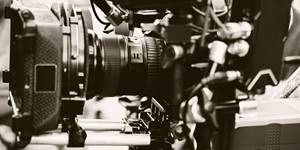Time to Read: 4 Minutes
At least three times a week, people ask Jeff Wright if he’s a voice actor. While his voice does have the warmth and clarity that you might associate with this profession, that’s not what he does for a living. No, he’s a sound professional of another kind: an audio teacher at Trebas and an audio engineer who’s worked on some noteworthy projects, such as Family Guy and Disney’s Sneakerella. His work has received numerous accolades, including Emmys, Peabody Awards, and Canadian Screen Awards.
We met Jeff in the film studio at Trebas Toronto to discuss his experience in the audio industry, common misconceptions about the field, the value of immediate feedback when learning, and more. The conversation has been edited and condensed for clarity.
What are the qualities of a successful audio professional?
If you’re a good person, it pays.
Go in. Learn all the terms, learn the gear, the process, memorize things, but also learn your team. Get everyone’s name. Be attentive. Listen. Do a good job. Make your work as good as it can possibly be. Those core qualities will help you get more gigs. People will remember your commitment to a good product and your positivity.
I’ve heard Snoop Dog is like that. He learns every single person’s name.
People like to work with good people.
Do you have to be a musician to also be a producer or recording engineer?
No. I think it’s good to speak the language, but you only have to know what sounds good. You have to be a lover of music and be able to explain what you like and don’t like about what’s happening in the moment.
Why study audio in a college setting?
There are two main benefits to a college learning environment: interactivity and teamwork.
Yesterday, a student said to me, “You know what, it is so great to have interactivity. I can ask why something is like this, what is the best way to do something, and I get a response right away.”
In other words, the feedback is immediate. You learn by doing under the guidance of people who do this for a living.
The other part of the equation is teamwork. When you work on a big production, like a TV show, teamwork is essential. If you are in anything that has a huge cast, there will be a lot of teams, so you have to learn to work with people. That itself is a skill. You learn that by default here.
What is the biggest misconception that people have about studying audio and working in audio?
Maybe how much work it can be and how fast you learn in this program. Once you start applying all the theory, you realize that there’s a lot to know out there. You really need to learn how to learn. You will learn how other engineers work and how to meet the many needs of clients.
The whole premise behind this school is that the lab exams are work scenarios. It is you in the room doing a session. Something might go wrong. You have to problem solve. You have to know the signal path. That signal path that we teach you to follow is used in every major studio in the world.
Do you have a hero?
My parents. They were really supportive of my career choice. Really supportive of my first rock band when I was 15 in the basement making a ton of noise. They were so supportive. I never once got a “be quiet.” They actually took a liking to some of the songs and made requests.
Among all the projects that you have worked on, which were your favourites?
Recording Ernie Coombs (aka “Mr. Dressup”) was a highlight because when I recorded him, I was suddenly five years old again, listening to him tell me a story. My mom wrote a letter to him a long time ago that she never got a response to. I casually mentioned this to him (Mr. Dressup), and he suddenly produced an official “Mr. Dressup” promotional show card from his jacket pocket and proceeded to write a lovey personalized greeting to her.
Another one was working with Seth MacFarlane on Family Guy. It was incredible to work on that show and see how Seth works, and the fact that he was cracking up when he was recording, when he was doing the voices of all the characters. Sometimes, we had to stop recording because he was laughing. But that’s why that show was successful. He was putting his heart into it. He was authentic. He loved it.
Another high point was seeing my name in the credits for the first time. That was when I worked on Angela Anaconda. It makes you feel like you’re part of something that’s going to last, something that will live on. At one point, I was in Mexico, and I heard Angela Anaconda dubbed in Spanish. That was really trippy. It made me realize that the things you can create, ideally, can be global.
To learn more about careers in audio engineering, explore our program page.


